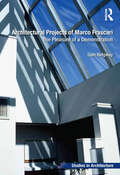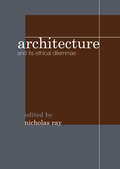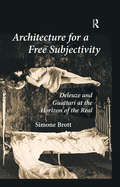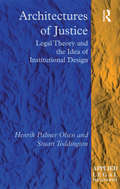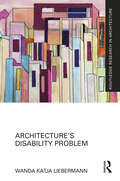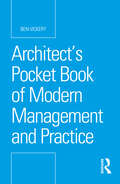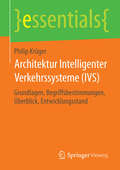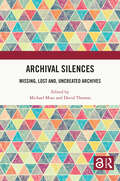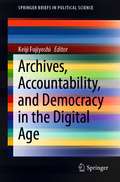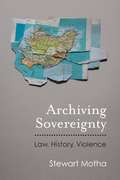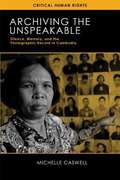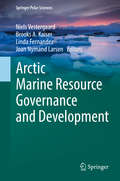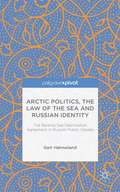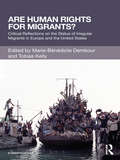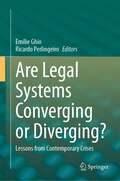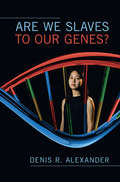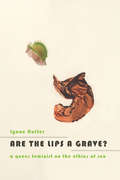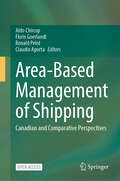- Table View
- List View
Architect's Legal Pocket Book (Routledge Pocket Books)
by Matthew CousinsA little book that’s big on information, the Architect’s Legal Pocket Book is the definitive reference guide on legal issues for architects and architectural students. This handy pocket guide covers key legal principles which will help you to quickly understand the law and where to go for further information. Now in its third edition, this bestselling book has been fully updated throughout to provide you with the most current information available. Subjects include contract administration, building legislation, planning, listed buildings, contract law, negligence, liability and dispute resolution. This edition also contains new cases and legislation, contracts including the RIBA contract administration certificates, inspection duties, practical completion, the Hackitt review, the Report of the Independent Inquiry into the Construction of Edinburgh Schools and practical issues facing architects. Illustrated with clear diagrams and featuring key cases, this is a comprehensive guide to current law for architects and an invaluable source of information. It is a book no architect should be without.
Architectural Projects of Marco Frascari: The Pleasure of a Demonstration (Ashgate Studies in Architecture)
by Sam RidgwayMarco Frascari believed that architects should design thoughtful buildings capable of inspiring their inhabitants to have pleasurable and happy lives. A visionary Italian architect, academic and theorist, Frascari is best-known for his extraordinary texts, which explore the intellectual, theoretical and practical substance of the architectural discipline. As a student in Venice during the late 1960s, Frascari was taught and mentored by Carlo Scarpa. Later he moved to North America with his family, where he became a fulltime academic. Throughout his academic career, he continued to work on numerous architectural projects, including exhibitions, competition entries, and designs for approximately 35 buildings, a small number of which were built. As a means of (re)constructing the theatre of imaginative theory within which these buildings were created, Sam Ridgway draws on a wide selection of Frascari’s texts, including his richly poetic book Monsters of Architecture, to explore the themes of representation, demonstration, and anthropomorphism. Three of Frascari’s delightful buildings are then brought to light and interpreted, revealing a sophisticated and interwoven relationship between texts and buildings.
Architecture and its Ethical Dilemmas
by Nicholas RayA cast of leading writers and practitioners tackle the ethical questions that architects are increasingly facing in their work, from practical considerations in construction to the wider social context of buildings, their appearance, use and place in the narrative of the environment. This book gives an account of these ethical questions from the perspectives of historical architectural practice, philosophy, and business, and examines the implications of such dilemmas. Taking the current discussion of ethics in architecture on to a new stage, this volume provides an accumulation of diverse opinions, focusing on architects' actions and products that materially affect the lives of people in all urbanized societies.
Architecture for a Free Subjectivity: Deleuze and Guattari at the Horizon of the Real
by Simone BrottArchitecture for a Free Subjectivity reformulates the French philosopher Gilles Deleuze's model of subjectivity for architecture, by surveying the prolific effects of architectural encounter, and the spaces that figure in them. For Deleuze and his Lacanian collaborator Félix Guattari, subjectivity does not refer to a person, but to the potential for and event of matter becoming subject, and the myriad ways for this to take place. By extension, this book theorizes architecture as a self-actuating or creative agency for the liberation of purely "impersonal effects." Imagine a chemical reaction, a riot in the banlieues, indeed a walk through a city. Simone Brott declares that the architectural object does not merely take part in the production of subjectivity, but that it constitutes its own. This book is to date the only attempt to develop Deleuze's philosophy of subjectivity in singularly architectural terms. Through a screening of modern and postmodern, American and European works, this provocative volume draws the reader into a close encounter with architectural interiors, film scenes, and other arrangements, while interrogating the discourses of subjectivity surrounding them, and the evacuation of the subject in the contemporary discussion. The impersonal effects of architecture radically changes the methodology, just as it reimagines architectural subjectivity for the twenty-first century.
Architectures of Inequality: Gender Pay Inequity and Britain’s Finance Sector (Feminist Perspectives on Work and Organization)
by Rachel VerdinAvailable open access digitally under CC-BY-NC-ND licence.The gender pay gap is economically irrational and yet stubbornly persistent. Focusing on the UK finance industry which is known for its gender pay disparity, this book explores the initiatives to fix gendered inequities in the workplace. Rachel Verdin crafts a unique framework, weaving extensive organizational data with women's lived experiences. Interviews uncover gaps in pay transparency, obstacles hindering workplace policies and the factors that are stalling progress for the future. This is an invaluable resource that offers key insights into gender equality and EDI measures shaped by legal regulations as well as corporate-driven initiatives.
Architectures of Justice: Legal Theory and the Idea of Institutional Design (Applied Legal Philosophy)
by Henrik Palmer Olsen Stuart ToddingtonLaw can be seen to consist not only of rules and decisions, but also of a framework of institutions providing a structure that forms the conditions of its workable existence and acceptance. In this book Olsen and Toddington conduct a philosophical exploration and critique of these conditions: what they are and how they shape our understanding of what constitutes a legal system and the role of justice within it.
Architecture’s Disability Problem (Routledge Research in Architecture)
by Wanda Katja LiebermannArchitecture’s Disability Problem explores the intersection of architecture and disability in the United States from the perspective of professional practice. This book uncovers why, despite the profound effect of the Americans with Disabilities Act on the architectural profession, there has been so little interest in design for disability in mainstream architecture. To counter this, the book investigates alternative approaches to designing with disability, through three case studies. These showcase both buildings and how design processes driven by disabled people shape design and professional roles.Combining historical research, formal and discourse analysis, and interviews with people who design, construct, use buildings, and advocate for access, the book develops a social understanding of how the buildings work at functional, affective, and symbolic levels. Architecture’s Disability Problem is aimed at three primary readers: practicing architects, architectural scholars, and members of disability scholar-activist communities. Grounded in detailed design studies, the author hopes to unearth the social meaning-making of architecture related to disability. Ultimately, the book makes an argument for a focus on disability in its own right—as well as on the body—in place of the dominance of formal, object-oriented approaches.This book presents and argues for a fundamental shift in the way architectural education, policy, and practice views and engages with disability. It will be key reading for students, researchers, practitioners and policy-makers.
Architect’s Pocket Book of Modern Management and Practice (Routledge Pocket Books)
by Ben VickeryThis book is an easily digestible guide to the management and practice knowledge needed to establish and run an architectural practice. It is of particular interest to those starting out in the profession and to students, whilst also being useful to architects more widely who need succinct information to assist them in the daily management of their work. The book sits beside the Architect’s Legal Pocket Book providing legal information and the Architect’s Pocket Book providing guidance in design. It covers all the main management and practice topics relevant to the running of an architectural business including setting up the company, the profession, project management, fees, office management, financial management and teamwork. It also looks at the state of the construction industry and the architectural profession today, new forms of practice, and how the profession is changing. The book is interweaved with pearls of wisdom and experience and reflections from architects, bringing the topics to life and aiding the reader’s understanding.
Architekten- und Ingenieurrecht nach Ansprüchen: Entscheidungshilfen für Auftraggeber und Auftragnehmer von Planung, Bauüberwachung, Projektleitung und -steuerung (Bau- und Architektenrecht nach Ansprüchen)
by Michael Christian Bschorr Peter BräuerNach Anspruchsgrundlagen geordnet werden die tatbestandlichen Voraussetzungen aller relevanten Ansprüche von Auftraggebern und Auftragnehmern von Planungs-, Objektüberwachungs-, Projektleistungs- und Projektsteuerungsleistungen dargestellt. Ablaufdiagramme und graphische Erläuterungen bieten dem Leser einen schnellen Überblick und praxisnahe Hilfestellungen. Die vorliegende 2. Auflage berücksichtigt das zum 1. Januar 2018 reformierte Werkvertragsrecht des BGB.
Architektur Intelligenter Verkehrssysteme: Grundlagen, Begriffsbestimmungen, Überblick, Entwicklungsstand (essentials)
by Philip KrügerPhilip Krüger liefert einen Überblick zur Architektur Intelligenter Verkehrssysteme (IVS) und vermittelt wichtige Grundlagen und Entwicklungstrends im Themenfeld. Der Autor beschreibt den Fortschritt in Deutschland zur Erarbeitung einer umfassenden und intermodalen IVS-Architektur und bewertet diesen genauer. Für die koordinierte und harmonisierte Weiterentwicklung von IVS werden Rahmenbedingungen benötigt, wie sie in einer nationalen IVS-Architektur beschrieben sind. Dabei darf eine nationale IVS-Architektur nicht als Hemmnis für Innovationen verstanden werden, sondern vielmehr als Basis jeder systematischen Weiter- und Neuentwicklung von IVS.
Archival Silences: Missing, Lost and, Uncreated Archives
by David Thomas Michael MossArchival Silences demonstrates emphatically that archival absences exist all over the globe. The book questions whether benign ‘silence’ is an appropriate label for the variety of destructions, concealment and absences that can be identified within archival collections. Including contributions from archivists and scholars working around the world, this truly international collection examines archives in Australia, Brazil, Denmark, England, India, Iceland, Jamaica, Malawi, The Philippines, Scotland, Turkey and the United States. Making a clear link between autocratic regimes and the failure to record often horrendous crimes against humanity, the volume demonstrates that the failure of governments to create records, or to allow access to records, appears to be universal. Arguing that this helps to establish a hegemonic narrative that excludes the ‘other’, this book showcases the actions historians and archivists have taken to ensure that gaps in archives are filled. Yet the book also claims that silences in archives are inevitable and argues not only that recordkeeping should be mandated by international courts and bodies, but that we need to develop other ways of reading archives broadly conceived to compensate for absences. Archival Silences addresses fundamental issues of access to the written record around the world. It is directed at those with a concern for social justice, particularly scholars and students of archival studies, history, sociology, international relations, international law, business administration and information science.
Archives, Accountability, and Democracy in the Digital Age (SpringerBriefs in Political Science)
by Keiji FujiyoshiThis book is the first attempt to introduce the current status of archival practices in Japan as well as the basic views of the populace on making records accessible to English readers. In general, Japan has not paid sufficient attention to keeping and utilizing records except in the field of historical research. This book thus examines Japanese attitudes about history, records management, information acts, the status of archivists of the constitution, and genealogical research practices and a description of archives. Consequently, such investigations clarify how both private and public archives function or fail to do so in those spheres of Japanese society. In addition, this book presents the efforts in wartime record keeping in Australia, which is significantly different from how the Japanese deal with such records. This book therefore provides a clear and concrete picture of the status of current archival practices in Japan and the thinking that underlies them. On the basis of such examinations, this book enables readers to understand to what extent and how the past affects the present through archives, to recognize the importance of archives, and to respect the past in order to maintain and develop perspectives in people’s lives.
Archiving Sovereignty: Law, History, Violence (Law, Meaning, And Violence)
by Stewart MothaArchiving Sovereignty shows how courts use fiction in their treatment of sovereign violence. Law's complicity with imperial and neocolonial practices occurs when courts inscribe and repeat the fabulous tales that provide an alibi for archaic sovereign acts that persist in the present. The United Kingdom's depopulation of islands in the Indian Ocean to serve the United States' neoimperial interests, Australia's exile and abandonment of refugees on remote islands, the failure to acknowledge genocidal acts or colonial dispossession, and the memorial work of the South African Constitution after apartheid are all sustained by historical fictions. This history-work of law constitutes an archive where sovereign violence is mediated, dissimulated, and sustained. Stewart Motha extends the concept of the "archive," as site of origin and source of authority, to signifying what law does in preserving and disavowing the past at the same time. Sovereignty is often cast as a limit-concept, constituent force, determining the boundary of law. Archiving Sovereignty reverses this to explain how judicial pronouncements inscribe and sustain extravagant claims to exceptionality and sovereign solitude. This wide-ranging, critical work distinguishes between myths that sustain neocolonial orders and fictions that generate new forms of political and ethical life.
Archiving the Unspeakable
by Michelle CaswellRoughly 1. 7 million people died in Cambodia from untreated disease, starvation, and execution during the Khmer Rouge reign of less than four years in the late 1970s. The regime’s brutality has come to be symbolized by the multitude of black-and-white mug shots of prisoners taken at the notorious Tuol Sleng prison, where thousands of #147;enemies of the state” were tortured before being sent to the Killing Fields. In Archiving the Unspeakable, Michelle Caswell traces the social life of these photographic records through the lens of archival studies and elucidates how, paradoxically, they have become agents of silence and witnessing, human rights and injustice as they are deployed at various moments in time and space. From their creation as Khmer Rouge administrative records to their transformation beginning in 1979 into museum displays, archival collections, and databases, the mug shots are key components in an ongoing drama of unimaginable human suffering.
Arctic Marine Resource Governance and Development (Springer Polar Sciences)
by Joan Nymand Larsen Niels Vestergaard Brooks A. Kaiser Linda FernandezThis book is based on presentations from the Conference ‘Arctic Marine Resource Governance’ held in Reykjavik Iceland in October 2015. The book is divided into four main themes: 1. Global management and institutions for Arctic marine resources 2. Resource stewards and users: local and indigenous co-management 3. Governance gaps in Arctic marine resource management and 4. Multi-scale, ecosystem-based, Arctic marine resource management’.<P><P> The ecosystem changes underway in the Arctic region are expected to have significant impacts on living resources in both the short and long run, and current actions and policies adopted over such resource governance will have serious and ultimately irreversible consequences in the near and long terms.
Arctic Politics, the Law of the Sea and Russian Identity: The Barents Sea Delimitation Agreement in Russian Public Debate
by Geir HønnelandThis book analyses the Russian opposition to the 2010 Barents Sea delimitation agreement in light of both the Law of the Sea and Russian identity, arguing that the agreement's critics and proponents inscribe themselves into different Russian narratives about Russia's rightful place in the world.
Are Cyborgs Persons?: An Account of Futurist Ethics (Palgrave Studies in the Future of Humanity and its Successors)
by Aleksandra Łukaszewicz AlcarazThis book presents argumentation for an evolutionary continuity between human persons and cyborg persons, based on the thought of Joseph Margolis. Relying on concepts of cultural realism and post-Darwinism, Aleksandra Łukaszewicz Alcaraz redefines the notion of the person, rather than a human, and discusses the various issues of human body enhancement and online implants transforming modes of perception, cognition, and communication. She argues that new kinds of embodiment should not make acquiring the status of the person impossible, and different kinds of embodiments may be accepted socially and culturally. She proposes we consider ethical problems of agency and responsibility, critically approaching vitalist posthuman ethics, and rethinking the metaphysical standing of normativity, to create space for possible cyborgean ethics that may be executed in an Extended Republic of Humanity.
Are Human Rights for Migrants?: Critical Reflections on the Status of Irregular Migrants in Europe and the United States
by Tobias Kelly Marie-Bénédicte DembourHuman rights seemingly offer universal protection. However, irregular migrants have, at best, only problematic access to human rights. Whether understood as an ethical injunction or legally codified norm, the promised protection of human rights seems to break down when it comes to the lived experience of irregular migrants. This book therefore asks three key questions of great practical and theoretical importance. First, what do we mean when we speak of human rights? Second, is the problematic access of irregular migrants to human rights protection an issue of implementation, or is it due to the inherent characteristics of the concept of human rights? Third, should we look beyond human rights for an effective source of protection? Written is an accessible style, with a range of socio-legal and doctrinal approaches, the chapters focus on the situation of the irregular migrant in Europe and the United States. Throughout the book, nuanced theoretical debates are put in the context of concrete case studies. The critical reflections it offers on the limitations and possibilities of human rights protections for irregular migrants will be invaluable for students, scholars and practitioners.
Are Legal Systems Converging or Diverging?: Lessons from Contemporary Crises
by Ricardo Perlingeiro Emilie GhioThis book focuses on two main aspects: legal convergence and crises. Despite the abundance of literature on legal convergence over the years, the question of whether legal systems are converging or diverging remains unanswered. This book provides a valuable contribution to questions concerning comparative law, legal convergence, and legal transplants by examining them through the lens of crises.Crises challenge countries’ legal systems and prompt institutional responses to tackle perceived shortcomings in the law. The crises witnessed by the world over the last two decades have highlighted two seemingly contradictory tendencies:(i) increased cooperation and a natural phenomenon of legal convergence as states find common solutions to common problems;(ii) a preference for state-centric solutions, which prioritise domestic interests; rejection of supranational standards and harmonisation efforts; and protection of domestic sovereignty.This book aims to determine whether, in times of crisis, foreign laws, rules, and concepts can transcend countries’ domestic legal systems, or whether states’ responses to crises lead to legal divergence and disintegration.Unlike traditional studies on convergence, this edited volume takes an international and cross-thematic approach, with chapters focusing on how legislation in selected jurisdictions has responded to crises. Therefore, the book’s originality lies in its truly global nature, with chapters and authors surveying jurisdictions in Africa, North and South America, Asia, Europe and Oceania. The breadth of legal areas covered, with a mix of private and public law, also add to its uniqueness.From Russia to Germany and from bankruptcy law to environmental law, the book examines whether, as a result of crises, policy and legal responses have adopted, copied, or implemented features, policies, principles and/or rules from other legal systems (convergence), or have departed from existing legal norms, adopting policies and rules that differ from those of other countries (divergence).
Are Prisons Obsolete? (Open Media Series)
by Angela Y. DavisWith her characteristic brilliance, grace and radical audacity, Angela Y. Davis has put the case for the latest abolition movement in American life: the abolition of the prison. As she quite correctly notes, American life is replete with abolition movements, and when they were engaged in these struggles, their chances of success seemed almost unthinkable. For generations of Americans, the abolition of slavery was sheerest illusion. Similarly,the entrenched system of racial segregation seemed to last forever, and generations lived in the midst of the practice, with few predicting its passage from custom. The brutal, exploitative (dare one say lucrative?) convict-lease system that succeeded formal slavery reaped millions to southern jurisdictions (and untold miseries for tens of thousands of men, and women). Few predicted its passing from the American penal landscape. Davis expertly argues how social movements transformed these social, political and cultural institutions, and made such practices untenable.In Are Prisons Obsolete?, Professor Davis seeks to illustrate that the time for the prison is approaching an end. She argues forthrightly for "decarceration", and argues for the transformation of the society as a whole.
Are We Slaves to our Genes?
by Denis R. AlexanderThere is a common misconception that our genomes - all unique, except for those in identical twins - have the upper hand in controlling our destiny. The latest genetic discoveries, however, do not support that view. Although genetic variation does influence differences in various human behaviours to a greater or lesser degree, most of the time this does not undermine our genuine free will. Genetic determinism comes into play only in various medical conditions, notably some psychiatric syndromes. Denis Alexander here demonstrates that we are not slaves to our genes. He shows how a predisposition to behave in certain ways is influenced at a molecular level by particular genes. Yet a far greater influence on our behaviours is our world-views that lie beyond science - and that have an impact on how we think the latest genetic discoveries should, or should not, be applied. Written in an engaging style, Alexander's book offers tools for understanding and assessing the latest genetic discoveries critically.
Are We the Next Endangered Species?: Bioweapons, Eugenics, and More
by Dr. Richard M. FlemingAre We the Next Endangered Species? unravels the complex web of historical events, misinformation, and the ominous convergence of bioweapons and eugenics In this thought-provoking new book, Dr. Fleming challenges us to navigate the murky waters of history, exposing parallel programs developed over the last 170 years in the United States. This riveting exploration unearths ancient civilizations that embraced slavery, sterilization, and eugenics, drawing chilling parallels to our present reality. Dr. Fleming confronts the uncomfortable truth: are we repeating the mistakes of the past while expecting different outcomes? Are we destined to replicate the errors that led to the rise of powerful individuals and organizations seeking ultimate control over others? Key revelations include the stealthy usurpation of power in the United States since the 1850s, the nation's pivotal role in developing biological and chemical weapons, and its shocking collaboration with Nazi scientists, doctors, and intelligence officers. Dr. Fleming unveils the shadowy world of covert operations, the establishment of the military-industrial complex, and the surrender of medical control to the federal government. Readers will discover the intricate pathways of biowarfare and eugenics converging with the emergence of COVID. They will learn about the gain-of-function bioweapons responsible for the pandemic and the parallel development of eugenic genetic vaccines. Fleming reveals the control wielded by the military-industrial complex and world leaders over your life, movement, property, and freedoms. This book is not just an exploration of the past or a revelation of how those in power are on the brink of realizing their ultimate control, it's a call to action. It doesn't just raise awareness—it empowers readers to understand, question, and take decisive action to halt the ominous path we're on. In a world where truth is elusive and power is coveted, this book is a beacon of knowledge, urging you to discover what you can do to stop the impending threats to our existence. The future hangs in the balance and Are We the Next Endangered Species? provides the roadmap to safeguard it.
Are Women Human?
by Catharine A. MackinnonMore than half a century after the Universal Declaration of Human Rights defined what a human being is and is entitled to, Catharine MacKinnon asks: Are women human yet? If women were regarded as human, would they be sold into sexual slavery worldwide; veiled, silenced, and imprisoned in homes; bred, and worked as menials for little or no pay; stoned for sex outside marriage or burned within it; mutilated genitally, impoverished economically, and mired in illiteracy--all as a matter of course and without effective recourse? The cutting edge is where law and culture hurts, which is where MacKinnon operates in these essays on the transnational status and treatment of women. Taking her gendered critique of the state to the international plane, ranging widely intellectually and concretely, she exposes the consequences and significance of the systematic maltreatment of women and its systemic condonation. And she points toward fresh ways--social, legal, and political--of targeting its toxic orthodoxies. MacKinnon takes us inside the workings of nation-states, where the oppression of women defines community life and distributes power in society and government. She takes us to Bosnia-Herzogovina for a harrowing look at how the wholesale rape and murder of women and girls there was an act of genocide, not a side effect of war. She takes us into the heart of the international law of conflict to ask--and reveal--why the international community can rally against terrorists' violence, but not against violence against women. A critique of the transnational status quo that also envisions the transforming possibilities of human rights, this bracing book makes us look as never before at an ongoing war too long undeclared.
Are the Lips a Grave?: A Queer Feminist on the Ethics of Sex
by Lynne HufferLynne Huffer's ambitious inquiry redresses the rift between feminist and queer theory, traversing the space of a new, post-moral sexual ethics that includes pleasure, desire, connection, and betrayal. She begins by balancing queer theorists' politics of sexual freedoms with a moralizing feminist politics that views sexuality as harm. Drawing on the best insights from both traditions, she builds an ethics centered on eros, following Michel Foucault's ethics as a practice of freedom and Luce Irigaray's lyrical articulation of an ethics of sexual difference.Through this theoretical lens, Huffer examines everyday experiences of ethical connection and failure connected to sex, including queer sexual practices, sodomy laws, interracial love, pornography, and work-life balance. Her approach complicates sexual identities while challenging the epistemological foundations of subjectivity. She rethinks ethics "beyond good and evil" without underestimating, as some queer theorists have done, the persistence of what Foucault calls the "catastrophe" of morality. Elaborating a thinking-feeling ethics of the other, Huffer encourages contemporary intellectuals to reshape sexual morality from within, defining an ethical space that is both poetically suggestive and politically relevant, both conceptually daring and grounded in common sexual experience.
Area-Based Management of Shipping: Canadian and Comparative Perspectives
by Claudio Aporta Aldo Chircop Floris Goerlandt Ronald PelotThis open access book fills a gap in the literature on shipping in a number of cross-cutting fields (including marine transportation law and policy, law of the sea, Indigenous rights, marine environmental management, and risk and safety studies). Moreover, the book includes a focus on the consideration of Indigenous rights in shipping, a topic of emerging importance. There are, to our knowledge, no directly competing titles with the same interdisciplinary approach to conceptualize, understand, and describe best practices for area-based management approaches. There are, however, related titles which cover some aspects of area-based management, usually from narrow disciplinary perspectives. Area-based management in the governance of shipping has become a useful and effective approach to promote maritime safety, maritime security, and pollution prevention and to mitigate the adverse impacts of shipping on the marine environment and coastal communities. Based on the results of a research project and a major workshop convened at Dalhousie University in Canada, this book consists of multidisciplinary studies and analyses of major issues pertaining to area-based management in shipping from a comparative perspective, but with the principal focus on Canada. The book contains both theoretical and empirical contributions.

